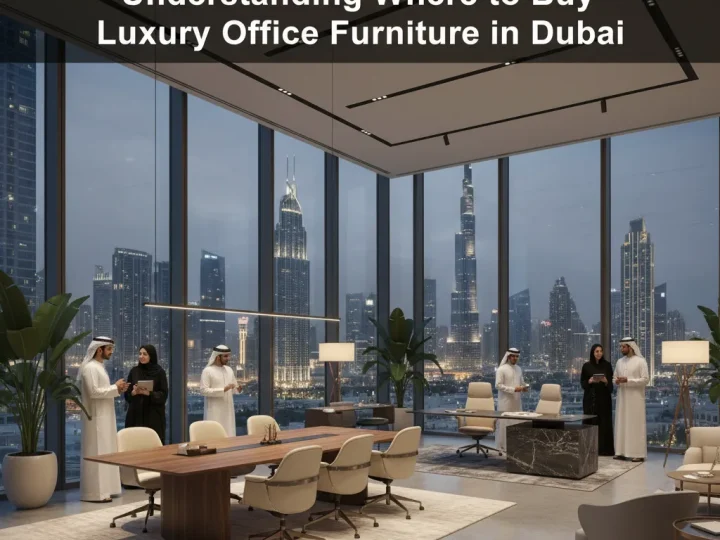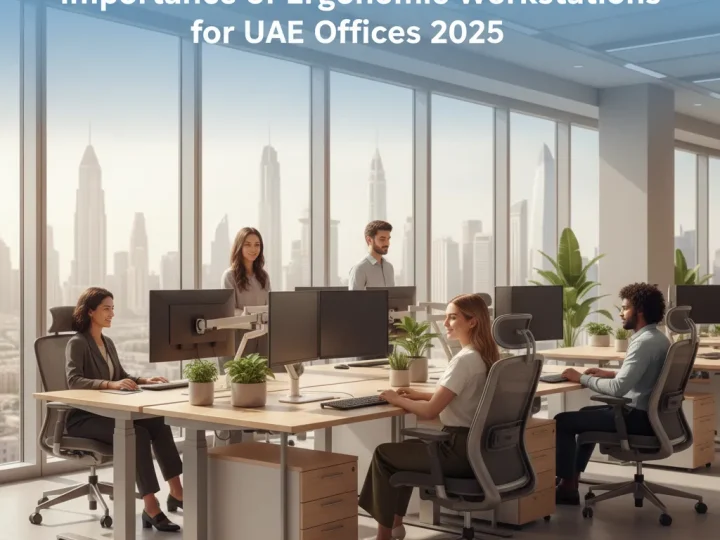

The world of office design is rapidly evolving, with modular office furniture taking center stage. In fact, the global modular furniture market is projected to soar to USD 130.6 Billion by 2033, showcasing a significant shift in how we approach workspaces. But here’s the twist: these clever designs offer far far more than just flexibility and style. They’re reshaping workplace culture, enhancing employee well-being, and promoting sustainability in ways we never thought possible. Prepare to discover how these innovations can revolutionize your office environment.
Table of Contents
- Latest Innovations In Modular Office Systems
- Flexible Layouts For Agile Workspaces
- Sustainability Trends In Office Furniture
- Boosting Employee Wellbeing With Design
Quick Summary
| Takeaway | Explanation |
|---|---|
| Smart Technology Integration | Modular office furniture is evolving with smart features like wireless charging and adjustable workstations, enhancing productivity and adaptability in the workspace. |
| Sustainability Trends | Eco-friendly materials and zero-waste design are crucial for modern office furniture, reflecting a commitment to environmental responsibility while aligning with corporate identity. |
| Ergonomic Design Importance | Ergonomically designed furniture significantly reduces physical strain, promoting employee health and satisfaction, making it essential for an effective workplace. |
| Mental Health Considerations | Office layouts that accommodate mental health, offering collaborative and quiet spaces, contribute to employee well-being and creativity, demonstrating an investment in holistic wellness. |
| Dynamic Space Flexibility | Modular furniture allows for rapid reconfiguration of workspaces, supporting both collaborative and focused work, essential for adapting to shifting team requirements and work styles. |
Latest Innovations in Modular Office Systems
The landscape of office design is undergoing a radical transformation, driven by cutting-edge technology and evolving workplace dynamics. Modular office systems are at the forefront of this revolution, offering unprecedented flexibility and innovation that redefine how businesses approach workspace design.
Smart Technology Integration in Modular Furniture
Today’s modular office systems are far more than static furniture pieces. The global modular furniture market is projected to reach USD 130.6 Billion by 2033, reflecting a dramatic shift towards intelligent workplace solutions. Emerging technologies are transforming traditional furniture into interactive, responsive environments.
Smart furniture now comes equipped with groundbreaking features that enhance productivity and user experience. Wireless charging stations seamlessly integrated into desk surfaces, motion sensors that adjust lighting and temperature, and automatic height-adjusting workstations are becoming standard. These innovations address the diverse needs of modern professionals, creating workspaces that adapt in real-time to individual preferences.
Collaborative and Flexible Workspace Designs
The traditional rigid office layout is rapidly becoming obsolete. Hexagon-shaped modular desks represent a prime example of innovative design that promotes collaboration while maintaining individual work zones. These geometric configurations allow teams to create dynamic environments that can be quickly reconfigured for different tasks and team sizes.
Modular systems now offer unprecedented customization. Employees can transform their workspace within minutes – expanding or contracting work areas, creating impromptu meeting spaces, or establishing private zones. This flexibility is crucial for businesses adapting to hybrid work models and changing team dynamics.
Sustainability and Ergonomic Innovations
Environmental consciousness is driving significant innovations in modular office systems. Manufacturers are increasingly using recycled materials, developing furniture with reduced carbon footprints, and creating modular designs that minimize waste. Ergonomic considerations are now deeply integrated into product design, with furniture that supports employee health and well-being.
Advanced materials like self-healing surfaces, adaptive acoustic panels, and furniture with built-in air purification systems are emerging. These innovations go beyond aesthetic appeal, directly contributing to creating healthier, more sustainable work environments. Companies investing in such technologies are seeing tangible benefits in employee satisfaction, productivity, and overall workplace performance.
The future of office design is modular, intelligent, and deeply responsive to human needs. As technology continues to evolve, we can expect even more sophisticated solutions that blur the lines between furniture, technology, and workspace experience.
Flexible Layouts for Agile Workspaces
In the rapidly evolving landscape of modern work environments, agile workspaces have become more than just a trend – they are a strategic necessity for businesses seeking to optimize productivity, employee satisfaction, and organizational adaptability.

Dynamic Space Transformation Strategies
Modular office furniture has revolutionized workspace design by enabling quick and seamless transformations to support both collaborative teamwork and individual focused work. Key elements like height-adjustable desks, mobile storage units, and movable partitions now provide unprecedented flexibility for organizations.
The ability to reconfigure spaces rapidly allows companies to respond to changing team dynamics, project requirements, and workforce needs. Employees can now transition from individual workstations to collaborative zones within minutes, breaking down traditional spatial barriers and promoting a more dynamic work culture. This adaptability is particularly crucial for businesses embracing hybrid work models, where office spaces must accommodate fluctuating occupancy levels and diverse work styles.
Acoustic Solutions and Privacy Considerations
Noise remains a significant productivity challenge in open office environments. According to a Steelcase study, 70% of employees report that workplace noise negatively impacts their concentration and overall work performance. In response, modular acoustic solutions have emerged as a critical innovation in workspace design.
Modular soundproof phone booths and acoustic partitions offer employees personal spaces for focused work, confidential conversations, and virtual meetings without requiring extensive structural modifications. These portable solutions can be easily moved, reconfigured, or removed, providing organizations with unprecedented spatial flexibility. By integrating these acoustic elements, companies can create versatile environments that balance collaboration and individual productivity.

Hybrid Furniture and Personalization
The rise of hybrid work has driven the development of multifunctional, highly adaptable furniture solutions. Contemporary modular furniture now features foldable partitions, transformable chairs, and modular desks that enable workers to quickly customize their workspace according to personal preferences and immediate needs.
These furniture designs recognize that modern professionals require workspaces that can effortlessly transition between different modes of work. A single furniture piece might serve as an individual workstation, a collaborative space, or a quick meeting area within moments. This level of personalization not only enhances employee comfort but also supports diverse work styles and promotes a more inclusive, flexible work environment.
As workplace dynamics continue to evolve, flexible layouts will remain a cornerstone of innovative office design. By embracing modular, adaptable solutions, organizations can create responsive workspaces that enhance productivity, employee well-being, and organizational agility.
Sustainability Trends in Office Furniture
Sustainability has transformed from a corporate buzzword to a critical imperative in office furniture design, reflecting a global commitment to environmental responsibility and ecological preservation. Modern organizations are increasingly recognizing that sustainable office furniture represents more than an aesthetic choice – it’s a strategic approach to reducing environmental impact and promoting corporate social responsibility.
Eco-Friendly Material Innovations
Sustainable materials are revolutionizing office furniture manufacturing . Designers and manufacturers are pioneering innovative approaches that prioritize recycled wood, rapidly renewable bamboo, biodegradable fabrics, and low-emission finishes. These materials not only minimize environmental footprint but also create furniture pieces with unique aesthetic and functional qualities.
Bamboo, for instance, grows significantly faster than traditional hardwoods and requires minimal agricultural inputs. Recycled plastic materials are being transformed into durable, high-performance office furniture components, effectively turning waste into valuable design resources. Manufacturers are developing advanced techniques to create furniture that maintains structural integrity while substantially reducing carbon emissions during production.
Zero-Waste Design and Circular Economy
Zero-waste practices are becoming a defining characteristic of progressive office furniture design. Companies are implementing comprehensive recycling and waste-reduction programs that extend far beyond traditional manufacturing processes. The circular economy model is gaining prominence, where furniture is designed with its entire lifecycle in mind – from initial production to eventual recycling or repurposing.
Modular furniture plays a crucial role in this sustainable approach. Designs that allow easy reconfiguration inherently reduce waste by extending product lifecycles. Instead of replacing entire furniture sets, organizations can now adapt and modify existing pieces, significantly reducing material consumption and environmental impact.
Corporate Sustainability and Brand Image
Sustainable office furniture has emerged as a powerful statement of corporate values and commitment to environmental stewardship. Forward-thinking companies understand that their furniture choices directly reflect their brand’s ecological consciousness. Employees and clients increasingly evaluate organizations based on their sustainability practices, making eco-friendly furniture a critical component of corporate identity.
Beyond environmental benefits, sustainable furniture often demonstrates superior long-term value. High-quality, responsibly manufactured pieces typically offer enhanced durability, reduced maintenance costs, and improved workplace aesthetics. This approach represents a holistic investment in both environmental preservation and organizational efficiency.
As global awareness of environmental challenges continues to grow, sustainable office furniture will undoubtedly become the standard rather than the exception. Organizations that embrace these innovative, environmentally conscious design principles are not just making a statement – they are actively contributing to a more sustainable future.
Boosting Employee Wellbeing with Design
Employee wellbeing has emerged as a paramount consideration in modern workspace design, transforming from a peripheral concern to a strategic priority for forward-thinking organizations. The integration of thoughtful, human-centric design principles in office furniture and layout directly impacts employee health, productivity, and overall job satisfaction.
Ergonomic Design and Physical Health
Research indicates that modular office furniture with ergonomic design significantly reduces physical strain, minimizing back pain and fatigue among employees. Adaptive furniture that allows for personalized adjustments – such as height-adjustable desks, chairs with lumbar support, and flexible workstations – enables individuals to create environments that support their unique physical needs.
Ergonomic design goes beyond mere comfort; it’s a critical intervention in workplace health. By providing furniture that supports natural body mechanics, organizations can prevent long-term musculoskeletal issues, reduce workplace-related injuries, and demonstrate a genuine commitment to employee wellness. Features like dynamic sitting options, adjustable monitor stands, and anti-fatigue mats contribute to a holistic approach to physical well-being.
Mental Health and Workspace Psychology
Modular office layouts are increasingly designed with mental health considerations in mind. Collaborative zones, quiet spaces, and adaptable workstations create environments that support diverse psychological needs and work preferences. These designs recognize that employee well-being is not just physical but deeply psychological, requiring spaces that can accommodate different work styles, stress levels, and social interactions.
Natural lighting, acoustic management, and spaces that allow for both collaboration and solitude are becoming essential elements of wellness-focused design. By providing employees with control over their immediate environment, organizations can reduce stress, enhance creativity, and foster a sense of autonomy that is crucial for mental health and job satisfaction.
Holistic Wellness and Organizational Culture
Global workplace trends demonstrate that employee wellness is now a key driver in office design decisions. Companies are recognizing that their physical workspace is a powerful tool for communicating organizational values, attracting top talent, and maintaining a competitive edge in talent retention.
Wellness-oriented design extends beyond furniture to include elements like indoor plants, dedicated relaxation areas, standing meeting zones, and spaces that encourage movement and physical activity. These design choices reflect a comprehensive understanding of wellness that encompasses physical health, mental clarity, social connection, and overall employee experience.
As the boundaries between work and personal life continue to blur, creating workspaces that genuinely support employee wellbeing is no longer optional – it’s a fundamental requirement for organizations seeking to thrive in a complex, dynamic work environment. The most successful companies will be those that view their workspace not just as a physical location, but as a holistic ecosystem designed to nurture, support, and inspire their most valuable asset: their people.
Frequently Asked Questions
What are the latest trends in modular office furniture?
Modular office furniture trends include smart technology integration, sustainable materials, ergonomic design, and flexible workspace layouts that support collaborative and individual work styles.
How does smart technology enhance modular office furniture?
Smart technology in modular office furniture includes features like wireless charging stations, automatic height adjustments, and motion sensors that optimize workspace conditions for productivity and comfort.
Why is sustainability important in office furniture design?
Sustainability is crucial in office furniture design as it reflects a company’s commitment to environmental responsibility, reduces waste, and often leads to lower long-term costs through the use of durable, eco-friendly materials.
How can modular office furniture improve employee wellbeing?
Modular office furniture improves employee wellbeing by providing ergonomic designs that reduce physical strain, creating adaptable spaces that accommodate mental health needs, and fostering a flexible work environment that supports different work styles.
Transform Your Workspace with SAGTCO’s Innovative Solutions
The future of office design is modular, flexible, and tailored to meet the diverse needs of today’s workforce, as highlighted in our recent article on the Top Trends in Modular Office Furniture. With employees seeking adaptable workspaces that blend collaboration and privacy, the challenge lies in providing environments that enhance productivity and well-being. As workplaces transition towards hybrid models, the demand for ergonomic designs and smart technology integration becomes critical.
Imagine a workspace where every piece of furniture adapts to the unique preferences of your team, transforming from individual work zones to collaborative hubs in just moments.

At SAGTCO, we understand these evolving needs and are here to help you thrive. Our extensive range of modern and customizable office furniture includes features such as height-adjustable desks and modular designs that promote both collaboration and privacy. Explore our user-friendly platform for tailored solutions, expert consultations, and free space planning that turn your vision for an effective office into reality. Ready to redefine your workspace?
Transform your environment today! Visit us at sagtco.com and discover how we can elevate your office to meet tomorrow’s demands.




